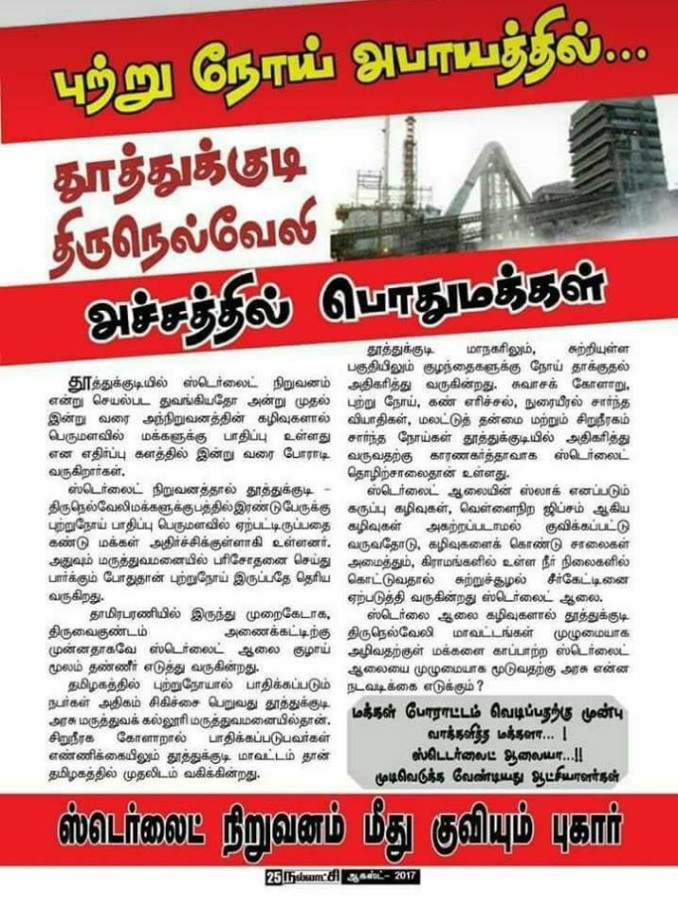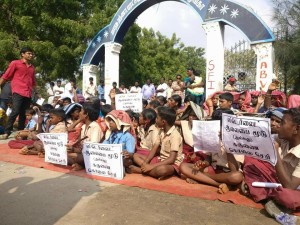
15th February. On Monday up to 500 people declared a hunger strike and indefinite protest against the planned expansion of Vedanta subsidiary Sterlite’s copper smelter in Thoothukudi (Tuticorin), Tamil Nadu. Two days into the protest police rounded up and arrested 270 people including many women and children, eventually releasing all except eight so-called ringleaders including social worker and Anti Sterlite Struggle Federation Coordinator Professor Fatima Babu, who are still being held by police. Large groups of school children and their mothers made up the majority of the protest. Their placards and statements to the media demand an end to years of toxic pollution from the plant, which is causing respiratory diseases and fainting, especially affecting the children, with long term consequences to their health. Water is also being polluted, and huge amounts used by the plant, in an already water-stressed area.
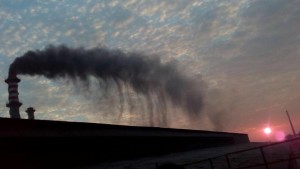
Sterlite, which was the first company set up by Anil Agarwal, before he launched Vedanta Resources in London, has already started construction of a new 4 million tonne/year smelter in the town, nearly doubling its existing capacity. Following its usual pattern and demonstrating its sense of legal impunity, the company does not yet have full Environmental Clearance for the new construction. Sterlite’s existing smelter is a second hand plant from Chile, built in the SIPCOT industrial park, just outside of Thoothukudi town in 1996, after being turned down by Ratnagiri in Maharastra due to pollution fears. In 2013 a major leak of sulphur gas from the plant affected thousands in the town, leading to mass protests by local taxi and fishermens trade unions among others, and the temporary closure of the plant. Journalists and local people have reported on illegal waste dumps around the town, and in the sea, and investigations of port data revealed that Vedanta were using highly contaminated imported copper concentrates, producing 2.2 tonnes of uranium and 441 tonnes of arsenic between 2009 and 2010 alone. The plant emits sulphur dioxide, arsenic and heavy metals into the surrounding area.
 On 15th Feb Tuticorin social activists handed over a petition to the District Collector, Venkadesh, demanding the release of the imprisoned protesters. The letter stated:
On 15th Feb Tuticorin social activists handed over a petition to the District Collector, Venkadesh, demanding the release of the imprisoned protesters. The letter stated:
‘In Tuticorin District water, land and air and everything is being polluted by the Sterlite establishment. The people protesting peacefully against the expansion of the plant were charged and imprisoned by the police. Take action to release them immediately and withdraw the charges. Action must be taken to stop the police pressure and atrocities unleashed on innocent people fighting for their rights.’
In September 2017 the National Green Tribunal (NGT) issued a judgment, following the show cause notice they had issued to Sterlite in March 2017 for several instances of toxic waste dumping and pollution as well as operating the smelter above its consented capacity. Many tonnes of copper slag were found dumped in the Upper Odai river, which Sterlite claimed they had sold to a developer for levelling of a construction site. The Upper stream was also blocked with toxic copper slag causing a ‘manmade disaster’.
 The judgment reveals that Sterlite had expanded the smelting capacity of the plant without permission, and had operated without authorisation under the Hazardous Wastes (Management, Handling and Transboundary Movement) Rules, 2008 between 9.7.2013 and 24.8.2017. SO2 pollution was being experienced by local residents, who were experiencing stinging in the nose and difficulty breathing as a result. Despite these issues the Tamil Nadu Pollution Control Board (TNPCB) had renewed Sterlite’s consent to operate under the Water (Prevention and Control of Pollution) Act, 1974 and Air (Prevention and Control of Pollution) Act, 1974, on 7.9.2017, leading the local residents, represented by advocate V. Ramasubbu to complain to the NGT, asking for compensation for pollution and environmental damage.
The judgment reveals that Sterlite had expanded the smelting capacity of the plant without permission, and had operated without authorisation under the Hazardous Wastes (Management, Handling and Transboundary Movement) Rules, 2008 between 9.7.2013 and 24.8.2017. SO2 pollution was being experienced by local residents, who were experiencing stinging in the nose and difficulty breathing as a result. Despite these issues the Tamil Nadu Pollution Control Board (TNPCB) had renewed Sterlite’s consent to operate under the Water (Prevention and Control of Pollution) Act, 1974 and Air (Prevention and Control of Pollution) Act, 1974, on 7.9.2017, leading the local residents, represented by advocate V. Ramasubbu to complain to the NGT, asking for compensation for pollution and environmental damage.
The applicants in the case also claimed that the TNPCB and Central Pollution Control Board (CPBC) had conspired to seal the Continuous Ambient Air Quality Monitoring Station (CAAQMS), which is supposed to monitor the Sulphur Dioxide (SO2), Nitrogen Oxide (NOx) and other noxious gases emitted from the smelter, rendering its data useless. Though this was denied by the CPCB the NGT reserved judgment on the issue, noting that ‘it is as if the grievances of the applicant has no redressal and he is left in lurch’, and suggested the NGT or TNPCB could investigate the claims. Download the full judgment here.
The judgment again highlights the ongoing sense of impunity held by Sterlite, which has continuously operated without various consents, and flagrantly violated environmental laws over the years, with the clear collusion of the TNPCB. In April 2013, following closure of the plant after the town-wide pollution incident which led to mass protests, the Supreme Court of India had imposed a Rs. 100 Crore fine on Sterlite for operating the plant without environmental consent between 1997 – 2012.
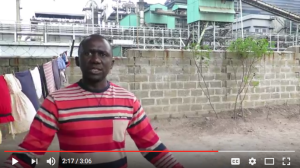 Meanwhile in Chingola, Zambia, Vedanta’s sister copper smelter was set up only 50m from a residential street. Residents of East 1st Street and the surrounding area have repeatedly had their homes filled with toxic fumes, and their walls cracking from explosions inside the smelter. Foil Vedanta activists found their eyes stinging and itching, and developed headaches and nosebleeds when visiting both Tuticorin and the East 1st Street area of Chingola. The long term impacts are unimaginable.
Meanwhile in Chingola, Zambia, Vedanta’s sister copper smelter was set up only 50m from a residential street. Residents of East 1st Street and the surrounding area have repeatedly had their homes filled with toxic fumes, and their walls cracking from explosions inside the smelter. Foil Vedanta activists found their eyes stinging and itching, and developed headaches and nosebleeds when visiting both Tuticorin and the East 1st Street area of Chingola. The long term impacts are unimaginable.
The article from The News Minute, and videos from Tamil Nadu news below detail the protest.
 Women’s statement from protest against Sterlite
Women’s statement from protest against Sterlite
Woman’s statement from the protest
TRANSLATION: She demands the govt. to supply her a bottle of poison that she can drink and die. such is the hellish situation – she says. There is a resolute demand here that the Sterlite plant has to close down.
The video starts with initial question whether this fight to close down Sterlite will continue through the night… The answer: “it is not about this night – however long it takes. We are not here to return to our township [Ur in Tamil] and die and perish… we are here already in front of cemetery/crematorium, aren’t we? Instead of splitting families the government can bury family by family […] Let it be recorded that this township was erased out of history … we will save the people of Thooththukudi even if we have to die… ”
She pleads for others in Thoothukkudi to “join in the protest now and ends with a call out for everyone across Thooththukudi district and Tamil Nadu to unite and join the protest” “to shut down Sterlite” – she concludes : “that’s the only way this can be done”
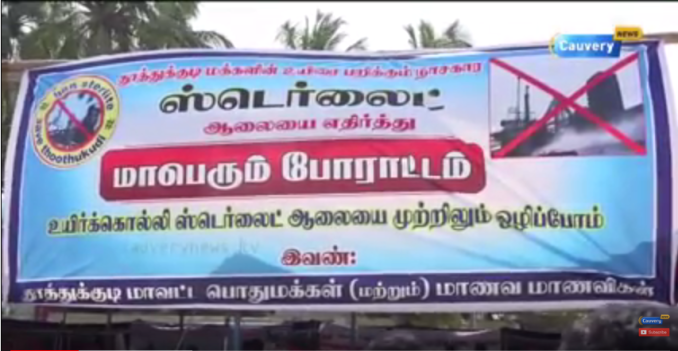
The News Minute:
‘Copper plant polluting our water’: 270 held for protesting Sterlite expansion in TN
People in the village went on a hunger strike after news of the expansion reached them.
Priyanka Thirumurthy, Wednesday, February 14

Over 250 people were detained in Tamil Nadu’s Thoothukudi district on Tuesday as they held a hunger strike against the expansion of the Sterlite Copper plant.
The protesters included activists who have opposed the plant for over two decades and villagers from Kumarattiyapuram village.
Part of the Vedanta group, the Sterlite Copper plant gained notoriety in 2013 when it was fined Rs 100 crore by the Supreme Court. This came after the land and water in the vicinity had been polluted following a gas leak in the plant. It was also found that the plant had been functioning without approval for a considerable period of time. Despite this, the apex court did not order for the plant to be shut down. The plant continued to operate, sparking occasional protests in the area. However, the protests gathered steam after the company announced its decision to expand the unit and take up more land in the district.
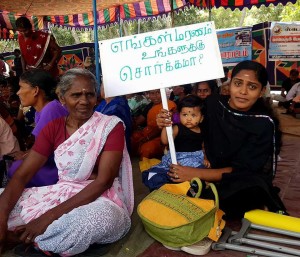
“The protest is not new and has been simmering for years now. Due to effluents from the plant, people in the district are already using contaminated water and are facing its consequences,” said Kittu, a protester from Thoothukudi who has been fighting against the copper plant for 22 years.
“The people in the village began protesting four days ago. The began the protest as soon as news of the expansion reached them. On Monday, they began a hunger strike in front of a local cemetery. Activists, women and children were all involved,” he added.The police allegedly warned the group and demanded that they disperse. When they did not agree, the police forcefully removed them.
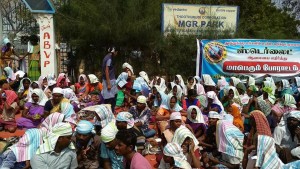 “People were peacefully protesting and the police arrested 270 agitators, including children, and took them away. What is wrong in speaking out against a plant that is ruining their lives?” asked Kittu.
“People were peacefully protesting and the police arrested 270 agitators, including children, and took them away. What is wrong in speaking out against a plant that is ruining their lives?” asked Kittu.
“The company had all the permissions it required to expand the plant. They had clearances from the Tamil Nadu Pollution Control Board as well. So, the protests were completely unlawful,” said Mahendran, the Thoothukudi Superintendent of Police.
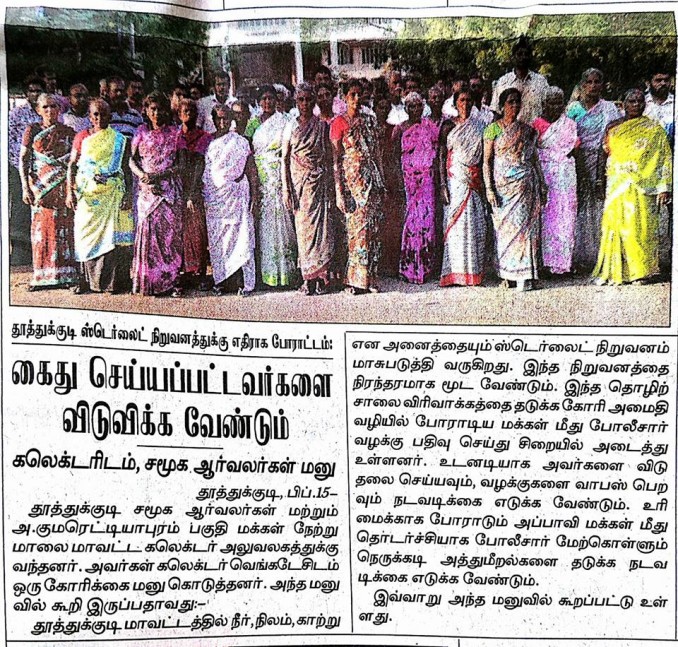
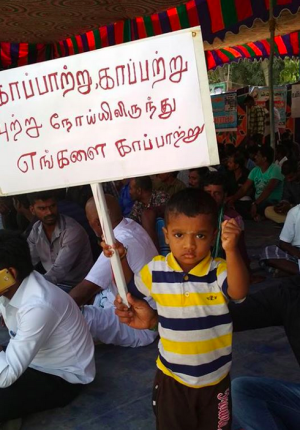
“We released all the children. The women have to be bailed out. But we have slapped cases against 8 persons who instigated the protests,” he added.
The cases booked against eight agitators fall under section 188 (Disobedience to order duly promulgated by public servant), section 143 (punishment to a member of an unlawful assembly) and section 441 (Criminal trespassing).
Villagers have been complaining of ailments such as asthma and other respiratory diseases.
“We are unable to breathe during the night because of the smoke. When we get up, there is a burning sensation in our throats,” said 31-year-old Dhanalakshmi, who lives in the area where the plant is situated.
“My children suffer the most. They have wheezing problems and are even fainting and falling in school because they have become so weak. Infertility is also a rising problem in our village,” she added. 18-year-old Mahalakshmi, who lives with her family, alleged that the company disposed of its waste on the village roads. “My father would walk on these roads barefoot and has developed a terrible rash. It is getting worse every day and these people are to blame,” she said.
“How can we allow them to expand operations further?” she questioned.
According to environmental activist Nityanand Jayaraman, air pollution is already a matter of worry in Thoothukudi. A copper smelter, he said, would make an already bad situation worse.
“Copper smelters are very polluting industries. They lead to the release of sulphur dioxide and dust particles in the air. In addition to this, a plant such as this will require a lot of surface water and resources, which should go for agriculture. Drinking water supply will be depleted,” he said.
